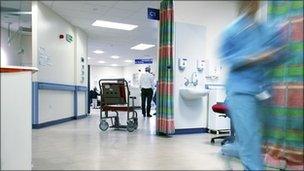Royal College of Nursing fears for 3,800 NHS Wales jobs
- Published

The first minister says there are tough decisions ahead for the NHS in Wales but health was a priority
A nursing union says it fears more than 3,800 NHS posts face the axe in Wales because of spending cuts.
The Royal College of Nursing (RCN) said this would put patient safety at risk, with fewer staff expected to deal with an ever increasing number of patients.
RCN Wales said the UK Government's Spending Review would mean almost ÂŁ2bn lost to the health budget in Wales over the next few years.
The assembly government said it was funding more nurses than ever before.
Across the UK, the RCN said almost 27,000 NHS posts were already earmarked for cuts, despite health service spending being "ring-fenced" in England.
The posts identified included nurses, midwives, health care assistants, clinical support staff, doctors, medical consultants and administrative staff.
But the chief executive of the NHS in England said he "did not recognise" the figure given by the RCN.
In Wales, the assembly government's draft budget for 2011-12 is due to be published next Wednesday.
Health minister Edwina Hart this week indicated that she believed ring-fencing health spending would damage other departments such as education and local government.
First Minister Carwyn Jones told the NHS Confederation conference in Cardiff on Thursday there were "tough decisions" ahead for the NHS in Wales, but it would always be a priority for the assembly government.
RCN Wales director Tina Donnelly said the union understood that these were "extremely difficult times".
"However, what we are hearing from our members in the local health boards is a freeze on replacing staff who have left, an increasing number of nursing posts being downgraded in the skill level and a complete halt to professional training," she said.
"All of this will impact on the quality of patient care and could, if unchecked, have an impact on patient safety, particularly in the community.
"I am today urging managers to prioritise safe staffing levels when they are looking for ways to save money because we know safe staffing levels mean safe patient care."
She said it would be a "tragedy" if the health service "took a step backwards because the voice of clinical staff with positive ideas was not heard".
"I would urge all local health boards to engage with staff to avoid the serious consequences of squeezing the NHS further," she added.
The RCN said there had been contact with thousands of nurses across the UK through its campaign website, and it had "independently verified" the data given using "board papers and trust documents".
The assembly government said it could not comment on a report that it had not had the opportunity to study in detail.
Efficient and effective
A spokesperson said: "However, investment in nursing has increased in recent years to 43% of the NHS workforce.
"There are now more nurses and other health professionals working in the NHS than ever.
"The annual operating framework target [which sets out the expectations of the NHS in Wales within any one financial year] is not aimed at reducing any particular staff group.
"It is intended to support NHS organisations in developing a workforce that is fit for the demands of modern health care and provides safe, efficient and effective care to all patients."
Sir David Nicholson, chief executive of the NHS in England, said the UK government was committed to the NHS.
He said of the RCN report: "The accuracy of these figures is not guaranteed and we do not recognise their figure."
- Published11 November 2010
- Published10 November 2010
- Published21 October 2010